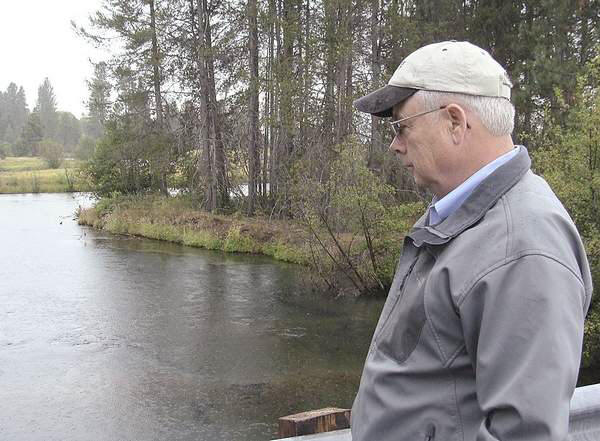|
www.capitalpress.com Ranchers grudgingly
accept Klamath water-sharing pact
Tim Hearden March 14, 2014, Capital Press
 Rancher
Roger Nicholson of Fort Klamath, Ore., looks out at the Wood
River on a rainy afternoon in Oregon’s Upper Klamath Basin. He
says a finalized agreement with the Klamath Tribes would prevent
years of litigation over water. Rancher
Roger Nicholson of Fort Klamath, Ore., looks out at the Wood
River on a rainy afternoon in Oregon’s Upper Klamath Basin. He
says a finalized agreement with the Klamath Tribes would prevent
years of litigation over water.
Many ranchers in Oregon's Upper Klamath Basin appear to
grudgingly accept a water-sharing agreement with the Klamath
Tribes that has resulted from months of talks. If the deal is
approved by most ranchers and tribal members, it will be part of
authorizing legislation in Congress.
FORT KLAMATH, Ore. — Many ranchers in Oregon’s Upper Klamath
Basin appear to grudgingly accept a water-sharing settlement
between irrigators and the Klamath Tribes that was finalized
earlier this month.
Rancher Roger Nicholson, a harsh critic of water calls by the
tribes and federal government that led to a shutoff of Upper
Basin irrigation pumps last summer, says the deal is the best
that ranchers could hope for and predicts it will be agreed to
by a vast majority of affected landowners.
“This at least allows some usage, and in some years quite a bit
of usage probably,” said Nicholson, who was involved in the
talks. “The only other alternative is years more of litigation.”
The talks came after a court last year granted the tribes senior
water rights in the Sycan, Wood and Williamson river watersheds
draining into Upper Klamath Lake, where the tribes say a decline
in sucker fish populations has threatened their livelihoods and
traditions.
The pact that the parties have been ironing out since late
December includes various restoration projects, stipulated
in-stream flows and the permanent retirement of 30,000 acre-feet
of water for restoring fisheries. Nicholson said landowners won
a key concession in that they’ll be compensated for land they
can’t use as a result of the deal.
If approved by ranchers and tribal members, the pact will be
included in legislation by U.S. Sen. Ron Wyden, D-Ore., to
authorize and fund the Klamath Basin Restoration Agreement and a
companion measure to remove four dams from the Klamath River.
To be certain, opposition to the Upper Basin agreement persists.
Jerry Jones, who operates a small ranch south of Chiloquin,
Ore., believes the agreement could spark new legal battles.
“It does away with our private property rights,” he said.
Bruce Topham, a rancher in the Sprague River Valley, said he’s
unsure whether he’ll sign the agreement. He objects to the
amount of land that ranchers would have to put in easements –
130 feet on each side of a river or stream, he said.
“We basically aren’t allowed to use it,” Topham said. “In our
case, it’s a lot of acres … You’re controlled on what you can do
on your own land.”
But rancher Becky Hyde, a vocal KBRA supporter who was involved
in the Upper Basin negotiations, said most landowners realize
that “everyone needs to bring their log to the fire so we can
make this thing work,” and that more participation means more
water.
“We know what the alternative to settlement looked like because
we lived through it last year,” Hyde said. “I think we have more
momentum toward a settlement than we’ve ever had.
“The thing about it is it also deals with our endangered species
issues to the best of their ability under the law,” she said.
“Frankly some of us are pretty interested in that part of it for
protection. We’ll see how it goes. I think right now it’s just
an important time for folks to understand what it means for
them.”
Nicholson believes this is the landowners’ last chance to
achieve a settlement over water.
“I’ve been involved in several other attempts to settle it, and
this probably is the last one,” he said. “If this isn’t settled
now, it will go into litigation for a long, long time.”
====================================================
In accordance with Title 17 U.S.C.
section 107, any copyrighted material
herein is distributed without profit or
payment to those who have expressed a
prior interest in receiving this
information for non-profit research and
educational purposes only. For more
information go to:
http://www.law.cornell.edu/uscode/17/107.shtml |

